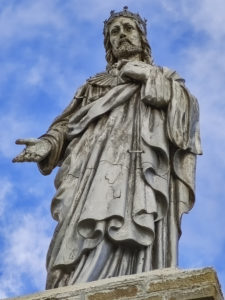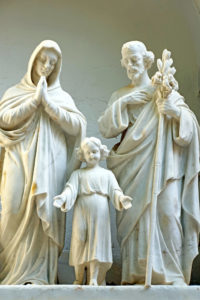What Was Born? (Part I)
O come, O come, Emmanuel,
And ransom captive Israel,
That mourns in lonely exile here,
Until the Son of God appear.
Rejoice! Rejoice! Emmanuel
Shall come to thee, O Israel.
– John Mason Neale (1818-1866), translation of an 8th century Latin monastic hymn
 At Christmas we celebrate the beginning of the most astounding and mystifying set of events in all of human history. Nothing about any of this is religious, since we know now that religions are man–made. By now, we have grown beyond the need to approach inexplicable events with superstitious terrors that made us need to build religions around them. But when these amazing events took place, religion-creation was still our response, so the religion of my childhood attributes a nonsensical set of ideas to some genuinely amazing facts. Knowing that, it may not surprise you to learn that the core Christian teaching that Jesus died to redeem us from God’s judgment for our sins is nonsense.
At Christmas we celebrate the beginning of the most astounding and mystifying set of events in all of human history. Nothing about any of this is religious, since we know now that religions are man–made. By now, we have grown beyond the need to approach inexplicable events with superstitious terrors that made us need to build religions around them. But when these amazing events took place, religion-creation was still our response, so the religion of my childhood attributes a nonsensical set of ideas to some genuinely amazing facts. Knowing that, it may not surprise you to learn that the core Christian teaching that Jesus died to redeem us from God’s judgment for our sins is nonsense.
In all my fifty years of looking for proof of that basic Christian belief, I never have found any evidence at all that the crucifixion of Jesus has made an afterlife difference for a single human being. And the volume of detailed and consistent evidence about the genuine afterlife that is available now is such that if Jesus actually had died for even the sins of just a few of us, we would easily find some confirmation! As I said last week, I love my childhood religion. Since I was eight years old, I have wanted to learn what happens at and after death so I could better understand my experiences of light; but more than that, I have so badly wanted to confirm that my Christian beliefs were real. I didn’t need much evidence. Maybe a single glimpse of a physical God on His actual throne? Some hint that there was a divine judgment? Maybe pearly gates and St. Peter with a list, or maybe even a celestial church with people saying how glad they were to have picked the right denomination? God, Jesus, and Christianity were my personal trinity. If I lost one, I feared that I might lose them all. So when at the age of 51, and after thirty years of earnestly trying, I finally gave up on finding any evidence that Jesus had died for our sins, I just closed my Bible and set it down. I stopped doing further afterlife research, and I spent the next two years pretending that none of that had ever happened.
 I have talked here before about the rainy afternoon when I finally trusted Jesus enough to pick up and read my Bible again. In one sitting I raced through all four Gospels, feeling nervous at first because I knew so much by then about what is actually true, and I loved the Lord with everything in me. I couldn’t bear to learn that He had been wrong! But Jesus had been right in breathtaking ways that I never before had noticed. He knew things two thousand years ago about God, reality, death, the afterlife, and the meaning and purpose of human life that I had learned from the afterlife evidence, but that really still can be found nowhere else. For example, Jesus told us in the Gospels at least the following facts:
I have talked here before about the rainy afternoon when I finally trusted Jesus enough to pick up and read my Bible again. In one sitting I raced through all four Gospels, feeling nervous at first because I knew so much by then about what is actually true, and I loved the Lord with everything in me. I couldn’t bear to learn that He had been wrong! But Jesus had been right in breathtaking ways that I never before had noticed. He knew things two thousand years ago about God, reality, death, the afterlife, and the meaning and purpose of human life that I had learned from the afterlife evidence, but that really still can be found nowhere else. For example, Jesus told us in the Gospels at least the following facts:
There is much more, too. Some of it is subtle or debatable, but these four points were enough on that rainy day to prove to me that the Being Whose words are reported in the Gospels came to earth two thousand years ago knowing things that He could not have known if He had not come directly from the highest Godhead!
Jesus did in fact live on earth. We know that now without question. If my own evidence from the dead is not proof enough, there are Christians who have found and offer proof in abundance! Erick-Woods Erickson is a radio host who just this week spoke again to the fact that Jesus did indeed exist. He said, “If he did not exist, then neither did the Greek philosopher Socrates. We have no writings from Socrates himself. We only know of his existence through the writings of other people. But no one would doubt Socrates existed. We actually have more eyewitness accounts of Jesus’s existence than of Socrates… The Apostle John was Jesus’s best friend. We know this from scripture. We also know this from Polycarp, Ignatius, and others. They studied under John, recounted his stories of being with Jesus, including stories not in scripture, and confirm John, Peter, Paul and others as eyewitnesses to Christ’s resurrection.” Erickson doesn’t mention the fact that there also are contemporaneous surviving notes of the existence of Jesus in nearby countries.
 So Jesus did indeed live on earth. We also know that He was crucified and died on earth, and He was interred in a cave, as was the custom. Then three days later He literally rose from the dead.
So Jesus did indeed live on earth. We also know that He was crucified and died on earth, and He was interred in a cave, as was the custom. Then three days later He literally rose from the dead.
And furthermore, the Jewish Law and the Prophets which became the Christian Old Testament contains a series of prophesies that can reasonably be tied to the birth and to the work of Jesus. To mention just three examples:
The prophet Jeremiah said of the Lord’s earthly ancestor, King David, “The days are coming,” declares the Lord, “when I will raise up for David a righteous Branch, a King who will reign wisely and do what is just and right in the land. In his days Judah will be saved and Israel will live in safety. This is the name by which he will be called: The Lord Our Righteous Savior” (Jer 23:5-6).
From Isaiah comes, “Therefore the Lord himself will give you a sign: The virgin will be with child and will give birth to a son, and you will call him Immanuel” (which means “God with us”) (Isaiah 7:14).
And finally, also from the great Isaiah comes my favorite prophesy of all. Jesse was King David’s father:
A shoot will come up from the stump of Jesse;
from his roots a Branch will bear fruit.
The Spirit of the Lord will rest on him—
the Spirit of wisdom and of understanding,
the Spirit of counsel and of might,
the Spirit of the knowledge and fear of the Lord—
and he will delight in the fear of the Lord.
He will not judge by what he sees with his eyes,
or decide by what he hears with his ears;
but with righteousness he will judge the needy,
with justice he will give decisions for the poor of the earth.
He will strike the earth with the rod of his mouth;
with the breath of his lips he will slay the wicked.
Righteousness will be his belt
and faithfulness the sash around his waist.
The wolf will live with the lamb,
the leopard will lie down with the goat,
the calf and the lion and the yearling together;
and a little child will lead them. The cow will feed with the bear,
their young will lie down together,
and the lion will eat straw like the ox.
The infant will play near the cobra’s den,
and the young child will put its hand into the viper’s nest.
They will neither harm nor destroy
on all my holy mountain,
for the earth will be filled with the knowledge of the Lord
as the waters cover the sea” (Isaiah 11:1-9).
 I love that passage! I see it as encompassing all of human history from the birth of Jesus to the farthest future. Simply replace the word “fear” with “love,” and know that we are only about halfway there. The beautiful promise of those last four lines sometimes feels like most of what sustains me now.
I love that passage! I see it as encompassing all of human history from the birth of Jesus to the farthest future. Simply replace the word “fear” with “love,” and know that we are only about halfway there. The beautiful promise of those last four lines sometimes feels like most of what sustains me now.
So even though the proponents of the religion that still bears His name have misunderstood who He actually was, we know now that the Baby whose birth we celebrate at Christmas grew to be a Being truly unique in human history. He knew things two thousand years ago that we can confirm today only by means of the testimony of those that we used to think were dead. And He was an amazingly powerful Being. He even was able to reanimate a body that had been dead for days!
With all of that in mind, it is time for us to ask a new and important question. Since the religion is wrong, and it has always been wrong, what was this gigantic series of events really all about? What was actually born in Bethlehem two thousand years ago? And why?
O come, Thou Rod of Jesse, free
Thine own from Satan’s tyranny;
From depths of hell Thy people save,
And give them victory o’er the grave.
Rejoice! Rejoice! Emmanuel
Shall come to thee, O Israel.
– John Mason Neale (1818-1866), translation of an 8th century Latin monastic hymn
The post What Was Born? (Part I) appeared first on Roberta Grimes.



